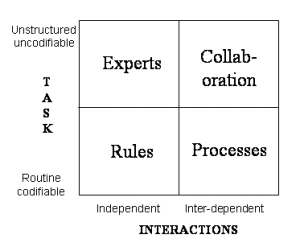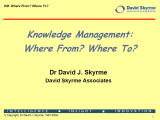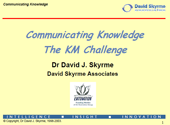Personal Knowledge Management (PKM)
One of the basics of knowledge management is getting the "right knowledge to the right people at the right time". This means a refocus on the individual, their tasks and their way of working, i.e. personal knowledge management. PKM has always been part of KM. For example, intranets and portals are ways of delivering to individuals some of the knowledge they need to perform their jobs. But PKM takes this a step further. How can we reduce the problem of information overload? How much of an individual's knowledge is truly being exploited? How are individuals being challenged, motivated and developed to enrich their knowledge to improve their effectiveness? These are the kinds of questions that PKM should address.
What Is Knowledge Work?
To be able to fully support knowledge workers we have to understand the nature of knowledge work. One segmentation, first proposed in the 1960s, a revisited more recently is that shown below.1.

This divides knowledge work into four different categories, accroding to the degree of complexity (vertical axis) and the level of individual independence (horizontal axis). Different approaches and support tools are needed in each category. For example, rule-based (transaction-oriented) relies heavily on training and embedded knowledge (in the form of software applications). On the other hand - and the area that PKM can have the greatest leverage - collaborative work requires shared workspaces, and support for communities of practice.
In terms of how they deal with knowledge, several mental processes come into play. These include:
- seeking specific knowledge - targeted searches
- sense-making of received information and knowledge, including..
- filtering: deciding what is important and what is not - sorting the 'wheat from the chaff'
- decision-making: deciding a course of action based on available knowledge, including how to route knowledge outputs
- updating of mental models - based on assimiliating new knowledge into what is already known.
And the way that individuals go about this depends on their personality traits and their individual preferences for processing information. For example, some people like imagery, others prefer dealing with numbers (e.g. spreadsheets), others prefer verbal rather than written communications.
So the combination of different types of work and different personal preferences, lead to an obvious conclusion:
The 'one-size fits all' approach will not be the most effective.
The PKM Toolkit
Taking account the differences, here are some things we should consider as central to the PKM approach:
- Understand individual needs and preferences - this usually means providing a degree of flexibility in software solutions; for more collaborative forms of knowledge work, a toolkit and applications that can be customized, should be sought.
- Personal coaching - help individuals understand their own work styles and how they perform best (know-yourself skills development is often overshadowed by job-specific training).
- Where possible embed knowledge capture and sharing into routine work processes; for less structured work, provide the mechanisms, opportunities and time for knowledge workers to develop and share their knowledge.
- Address the problem of 'information overload' - this is one area where some formal training may be useful; but it also takes an attitude of mind not to be distracted by an incoming information deluge ('just in case'), but to adopt a targeted search approach ('just in time').
- Provide a useful set of personal support tools - these could include a copy of "The Seven Habits of Highly Effective People" 2, and check list for evaluating, managing and developing your personal intellectual capital, not forgetting the provision of a suitable - and stimulating - office environment for knowledge work.
- Provide a useful set of online tools for knowledge discovery and knowledge discourse - message boards, discussion groups, wikis and social networking.
- Provide support for email management - email is such a vital tool, that it is important to develop good emailing skills; an organization email charter, that gets everyone following common standards is often a good KM 'quick-win'.
Finally, give due attention to the human factor aspects covered in 'human-centric KM', namely, understanding personal motivation, setting individual personal development goals, and introducing appropriate reward and recognition schemes.
Notes
1. 'Management strategies for individual knowledge', Ganesh D Bhatt and Tom Davenport, Journal of Knowledge Management, Vol. 6, No. 1, MCB Press (2002).
2. The Seven Habits of Highly Effective People, Stephen R. Covey, Simon & Schuster (1989 and 2004 15th Anniversary Edition)
Last updated: 19th March 2011


